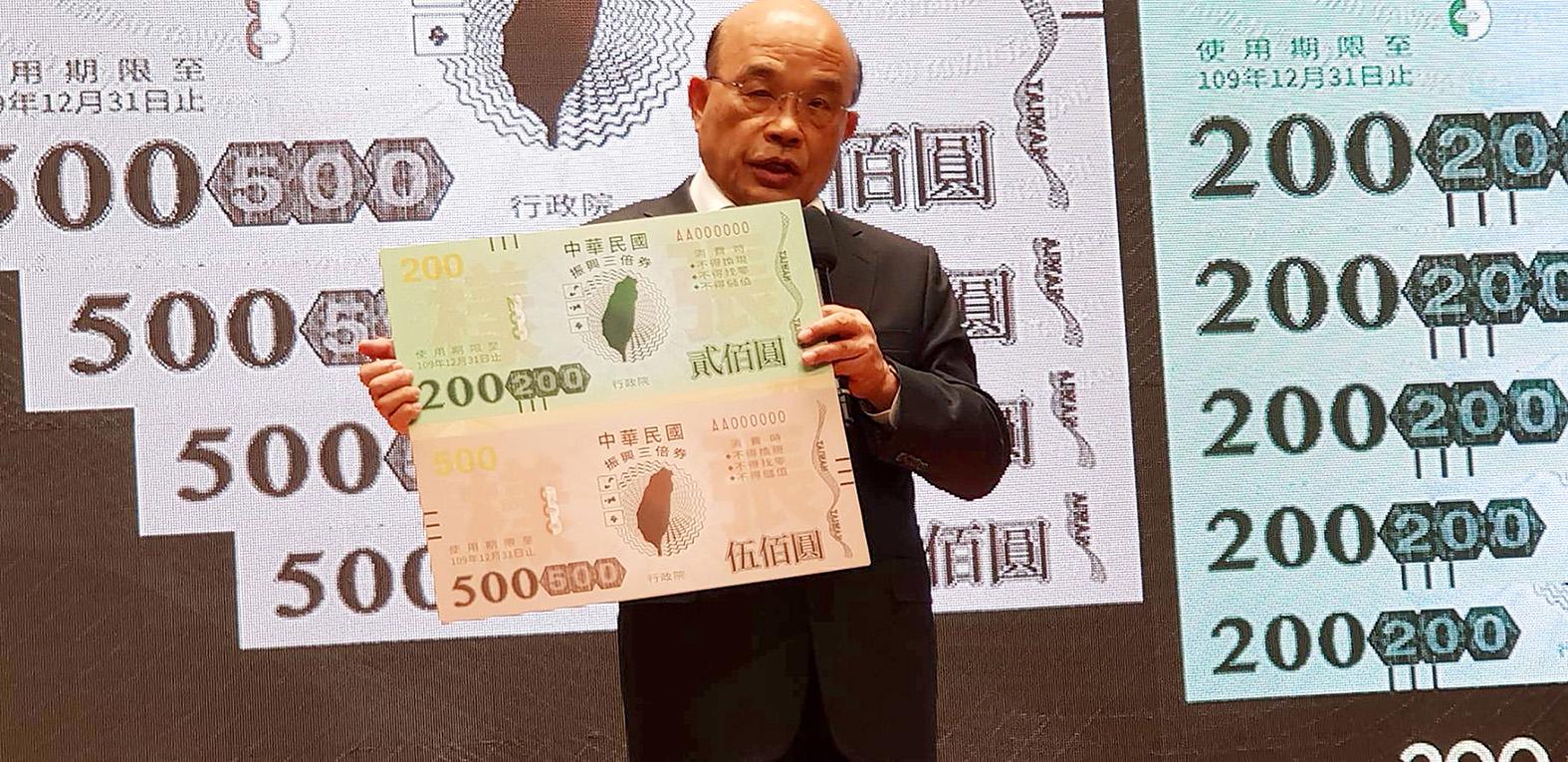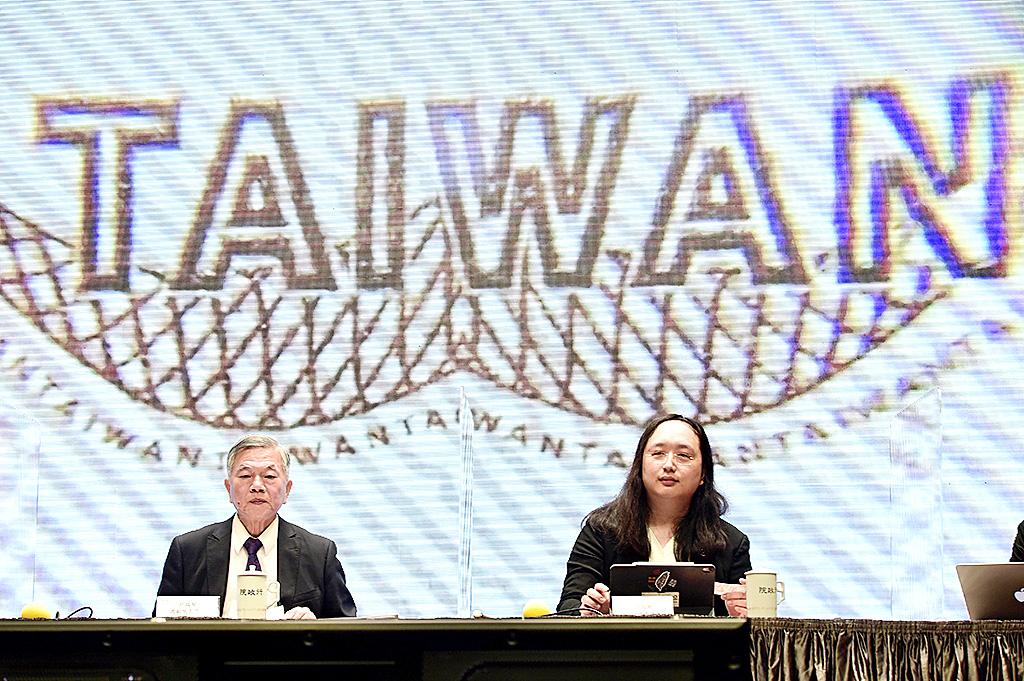Tobie Openshaw is confident that Taiwan’s government has good reasons for not including him in the Triple Stimulus Voucher Program, which launched at the beginning of this month. That’s just as well, because it seems unlikely he’ll ever discover the logic by which it was decided that he, along with other foreign residents not currently married to Taiwan citizens, shouldn’t receive the vouchers.
“We’ve stood side-by-side with our Taiwanese friends through the COVID-19 crisis, complying with government measures, cheering its success and sharing that news with the world at large. If the stimulus coupons are meant to be spent to keep the economy flowing, we’re more than happy to help spread it around,” says Openshaw, a South African documentary filmmaker who’s lived in Taiwan since 1994.
“Surely we deserve a small thank you, just like Taiwan citizens. It’s only [a per person net gain of] NT$2,000, so it’s not about the money,” he adds.

Photo: Lee Hsin-fang, Taipei Times
Openshaw isn’t alone in thinking that the symbolism matters more than the cash. On June 12, CNA reported that European Chamber of Commerce Taiwan Chairman Giuseppe Izzo had decried the government’s different treatment of foreign nationals versus local citizens, and highlighted the Triple Stimulus Voucher Program as a prime example.
The belief that people who live and work in Taiwan should be treated equally when it comes to benefitting from programs which their taxes help fund isn’t universal. Whether it’s shared by the officials who crafted the Triple Stimulus Voucher Program is hard to say, because they’ve shown little willingness to discuss their reasoning.
GOVERNMENT RUNAROUND

Photo: Tsong Chang-chin, Taipei Times
The Ministry of Economic Affairs (MOEA), the department in charge of the voucher program, took nine days to acknowledge a list of questions submitted by the Taipei Times on June 16, and a further eight to provide a detailed response. Even a charitable reading of the MOEA’s statements, which came in the form of an e-mail from Wang Yen-hsiang (王彥翔) of the Small and Medium Enterprise Administration, shows that at least four of the 10 questions went unanswered.
By the usual standards of central government units, which in this reporter’s 24-year experience answer English-language media inquiries promptly and thoroughly, the lack of information regarding a core inquiry — how the government came to its decision to strictly limit the eligibility of non-citizens — has been dismal.
On June 24, because the MOEA had yet to respond, the Taipei Times asked the Office of the Executive Yuan’s Spokesperson whether the eligibility criteria had been finalized by the MOEA or by the Executive Yuan, what reasoning stood behind the decision, and what factors were taken into consideration.
Within a few hours, a message was relayed to this reporter: “The spokesperson’s office... won’t be able to reply, but want to refer you to… the Ministry of the Interior (MOI).”
The MOI is responsible for immigration and naturalization, but on June 29 it advised that, because the voucher program “is mainly handled by the Ministry of Economic Affairs” the Taipei Times should contact the MOEA.
When the MOEA eventually provided their answers on July 3, all they had to say on the issue of eligibility was: “The qualifications of [Triple Stimulus Voucher Program] follow that of the Consumption Voucher Program in 2009 and they were confirmed and prescribed at the beginning of planning.”
In 2009, Taiwan had a different president and a different ruling party.
Taxpaying residents who don’t have a Taiwanese passport or spouse may never know if their exclusion from the stimulus program was down to budgetary calculation, or the application of “citizens first” or “citizens only” principles.
Reciprocity can’t have been a consideration. The US government has been sending out coronavirus stimulus checks to citizens, lawful permanent residents (green-card holders) and qualifying resident aliens. Hong Kong permanent residents aged 18 or above can apply for a HK$10,000 handout; it doesn’t matter what passport they carry.
Despite being asked directly, the MOEA didn’t say if it knew how much it would cost to add every foreigner holding a Taiwan resident card to the program.
A Kaohsiung native surnamed Lin (林), whose wife is Malaysian, is convinced the only reason why foreigners married to Taiwanese qualified for vouchers in 2009 and do so again in 2020 is that no party will risk alienating their spouses. “There’s lots of us. Thousands and thousands of voters,” he says.
Even though everyone in his household will get stimulus vouchers, Lin still gripes about government efforts to soften the economic impact of COVID-19. In his opinion, many of the one-off payments of NT$10,000 or NT$30,000 that were delivered to uninsured workers, farmers, and fishermen this spring went to individuals who didn’t especially need or deserve help.
MIGRANT WORKERS EXCLUDED
Another long-term, taxpaying foreign resident is more upset by the exclusion of migrant workers doing blue-collar jobs than she is by the fact she won’t personally benefit from the program.
“It just seems like such narrow thinking to only make [the vouchers] available to citizens or spouses of citizens. Foreign residents, even those who aren’t necessarily married to locals, are employed here, pay taxes here and are consumers who contribute to the economy here,” says Jenna Lynn Cody, an American married to a Canadian. “There’s no logical reason not to include an entire subset of taxpayers if the goal is a broad economic stimulus. Giving the blue-collar workforce, which includes many people from Southeast Asia, an economic boost is not only the right thing to do, it’s also good for Taiwan.”
While waiting for the MOEA to reply, the Taipei Times contacted the Ministry of Foreign Affairs (MOFA) to ask if excluding approximately 700,000 migrant workers from Southeast Asia who pay taxes and hold alien resident certificates in Taiwan is compatible with the government’s New Southbound Policy.
The policy, which aims to boost Taiwan’s engagement with Southeast Asia, is described on the Executive Yuan’s Web site as being “people centered.” On June 24, MOFA spokesperson Joanne Ou (歐江安) stressed that the voucher program and its eligibility rules “are a matter handled by the Ministry of Economic Affairs. Therefore, the Ministry of Foreign Affairs has no comments on this subject.”
Despite Taipei’s eagerness to build stronger ties with Jakarta and Hanoi, the Indonesian caregivers who look after many of the country’s elderly, and the Vietnamese factory workers who work nights, aren’t in line for stimulus vouchers.
At the same time, it appears that Taiwanese who owe money to the government in the form of tax arrears or unpaid fines will get vouchers — yet the bilingual Web site the government has created to inform the public (https: 3000.gov.tw), isn’t explicit, and the MOEA didn’t answer a direct question on this point.
Despite the MOEA’s failure to address issues that are important to Taipei Times readers, the ministry did clarify that “it is illegal for one person to purchase other people’s coupons” and that “the government has commissioned the Central Engraving and Printing Plant to print the coupons with advanced anti-counterfeiting techniques… [and] we have prepared an instruction video about how to recognize legitimate vouchers and detect forgeries.”
Thanks for that.

Jacques Poissant’s suffering stopped the day he asked his daughter if it would be “cowardly to ask to be helped to die.” The retired Canadian insurance adviser was 93, and “was wasting away” after a long battle with prostate cancer. “He no longer had any zest for life,” Josee Poissant said. Last year her mother made the same choice at 96 when she realized she would not be getting out of hospital. She died surrounded by her children and their partners listening to the music she loved. “She was at peace. She sang until she went to sleep.” Josee Poissant remembers it as a beautiful

For many centuries from the medieval to the early modern era, the island port of Hirado on the northwestern tip of Kyushu in Japan was the epicenter of piracy in East Asia. From bases in Hirado the notorious wokou (倭寇) terrorized Korea and China. They raided coastal towns, carrying off people into slavery and looting everything from grain to porcelain to bells in Buddhist temples. Kyushu itself operated a thriving trade with China in sulfur, a necessary ingredient of the gunpowder that powered militaries from Europe to Japan. Over time Hirado developed into a full service stop for pirates. Booty could

Lori Sepich smoked for years and sometimes skipped taking her blood pressure medicine. But she never thought she’d have a heart attack. The possibility “just wasn’t registering with me,” said the 64-year-old from Memphis, Tennessee, who suffered two of them 13 years apart. She’s far from alone. More than 60 million women in the US live with cardiovascular disease, which includes heart disease as well as stroke, heart failure and atrial fibrillation. And despite the myth that heart attacks mostly strike men, women are vulnerable too. Overall in the US, 1 in 5 women dies of cardiovascular disease each year, 37,000 of them

Before the last section of the round-the-island railway was electrified, one old blue train still chugged back and forth between Pingtung County’s Fangliao (枋寮) and Taitung (台東) stations once a day. It was so slow, was so hot (it had no air conditioning) and covered such a short distance, that the low fare still failed to attract many riders. This relic of the past was finally retired when the South Link Line was fully electrified on Dec. 23, 2020. A wave of nostalgia surrounded the termination of the Ordinary Train service, as these train carriages had been in use for decades